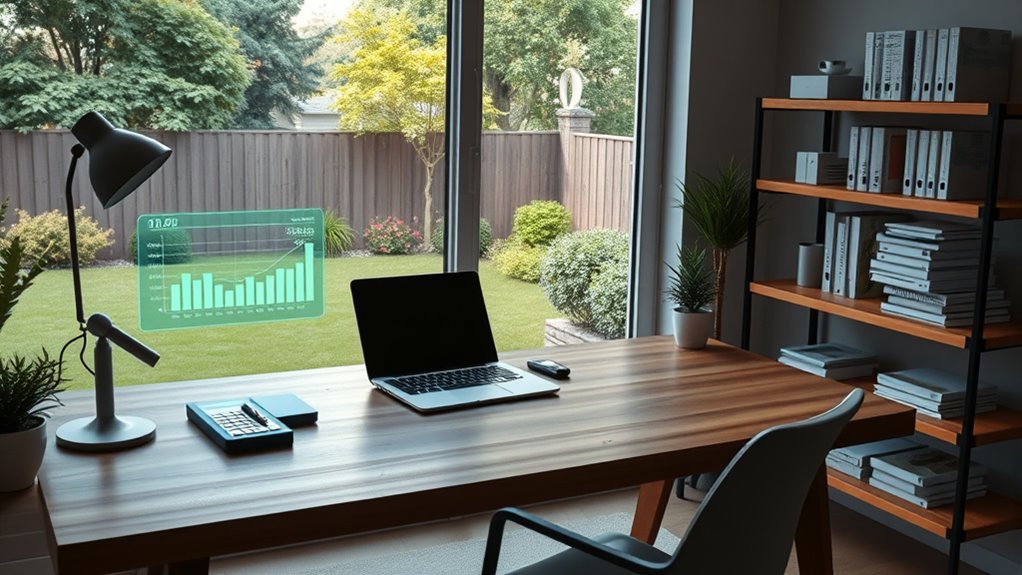To qualify for the home office deduction in 2025, you must use a space exclusively for your business that’s your principal place of operation or used for client meetings. Keep detailed records like bills, receipts, and measurements of the area you use. Personal use can disqualify your claim, so accurate documentation is essential. If you want to understand how to properly substantiate your deduction and avoid IRS pitfalls, continue exploring these key requirements.
Key Takeaways
- The home office must be used exclusively for business and serve as the principal place of work or client meeting location.
- Maintain detailed records such as utility bills, receipts, and space measurements to substantiate the deduction.
- Accurate documentation and consistent recordkeeping are essential for IRS compliance and audit preparedness.
- The deduction applies only if the space is used solely for business, with clear separation from personal use.
- Regularly update records to reflect any changes in workspace use or configuration, ensuring ongoing eligibility.

If you’re running a business from home in 2025, understanding the home office deduction can help you save money on your taxes. This deduction allows you to write off a portion of your home expenses, but only if you meet certain criteria. To determine deduction eligibility, the IRS requires that your home office is used exclusively for your business and is your principal place of business or a space where you regularly meet clients or customers. If your home office is used for personal reasons at any time, it may disqualify you from claiming the deduction.
Using a home office for business only can qualify you for tax deductions.
Accurately evaluating whether you qualify is vital, and it’s equally important to maintain proper recordkeeping requirements. Keeping detailed records helps substantiate your claim if you’re ever audited. This means retaining receipts, utility bills, mortgage or rent statements, and any other documents that support the portion of your home used for business. You should also keep a clear calculation of the percentage of your home used for work, whether that’s based on square footage or the number of rooms dedicated solely to your business activities.
When it comes to recordkeeping, being organized can save you a lot of headaches later. Use digital tools or binders to store all relevant documents, and regularly update your records to reflect any changes. For example, if you move or reconfigure your workspace, update your calculations accordingly. The IRS looks for consistent, accurate records that demonstrate your compliance with the rules. Remember that simply estimating or guessing the figures isn’t enough; precise documentation is necessary to claim the deduction confidently.
Additionally, understanding the different projector technologies used in home theater systems can help you create an optimal viewing environment, whether for entertainment or work presentations. Whichever method you choose, thorough recordkeeping ensures you can justify your deduction and avoid potential penalties.
Frequently Asked Questions
Can I Claim the Home Office Deduction if I Rent Instead of Own?
Yes, you can claim the home office deduction if you’re renting, as long as your space is used exclusively for work and meets home office eligibility criteria. Renting considerations include ensuring your workspace is dedicated and regular, not just occasional. Keep detailed records of your expenses, and remember, only the portion of your rent related to your home office can be deducted. This can help lower your taxable income effectively.
Are There Limits on the Size of My Home Office for Deduction?
Yes, there are limits on the size of your home office for the deduction. Generally, your home office must be used exclusively for work and is limited to the portion of your home dedicated to business activities. The deduction limits depend on your total home expenses and the percentage of your home used for work. Keep in mind that overly large home offices may not qualify, so stay within reasonable size guidelines.
How Does the Home Office Deduction Affect My State Taxes?
Your home office deduction can impact your state taxes, as some states follow federal rules while others have different allowances. You should check your state’s tax laws for specific implications. When claiming the deduction, you’ll need to meet reporting requirements, like filing specific forms or schedules. Be mindful that claiming the deduction at the federal level may influence your state tax liability, so consider consulting a tax professional for guidance.
Can I Deduct Home Office Expenses if I Work Remotely Part-Time?
You can absolutely deduct home office expenses if you work remotely part-time! Picture transforming a tiny corner into your personal productivity palace—your partial deduction can help offset costs like internet and utilities. Even if you work only a few hours a week, these expenses might qualify, making your remote work more affordable. Just guarantee your space is used exclusively for work, and you meet the IRS criteria for a partial deduction.
What Records Should I Keep to Substantiate My Home Office Deduction?
You should keep detailed expense documentation, including receipts and bills related to your home office, and maintain records of your space measurement to substantiate your deduction. Take photos or keep floor plans showing your designated workspace. Accurate records guarantee you can support your claim if questioned by the IRS. Regularly update your documentation and measurements to reflect any changes, making it easier to justify your deduction during tax season.
Conclusion
Mastering the home office deduction can feel overwhelming, but it’s your secret weapon for saving big on taxes in 2025. By understanding the rules and keeping thorough records, you access the potential to dramatically reduce your tax burden. Don’t let this opportunity slip through your fingers—it’s your chance to keep more of your hard-earned money and power your business forward. Embrace the knowledge and make this deduction work tirelessly for you!








